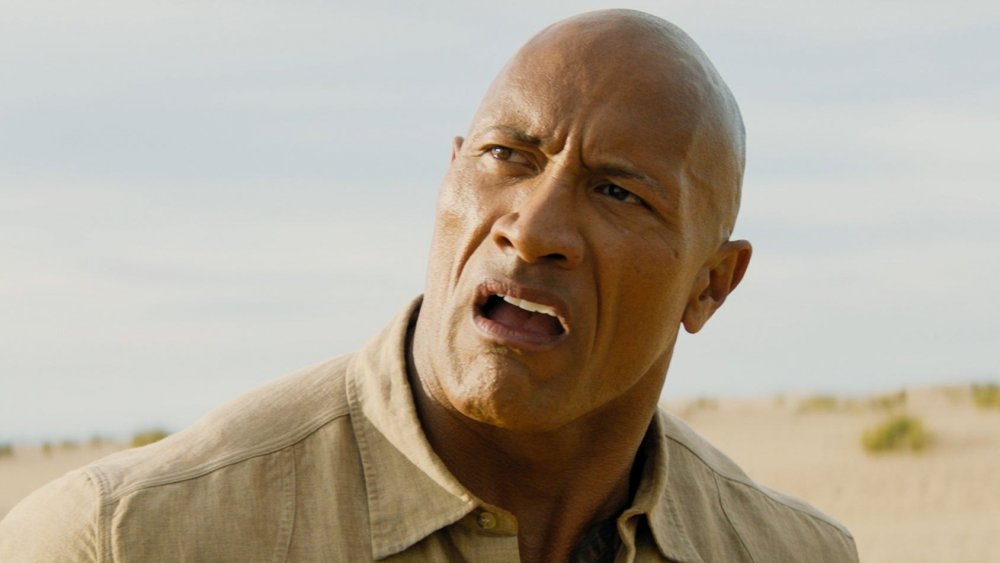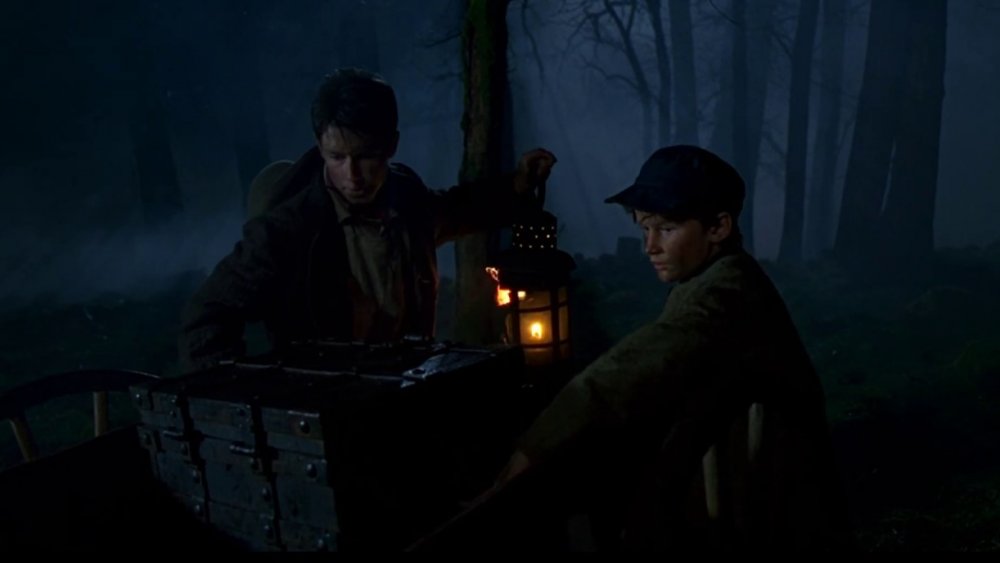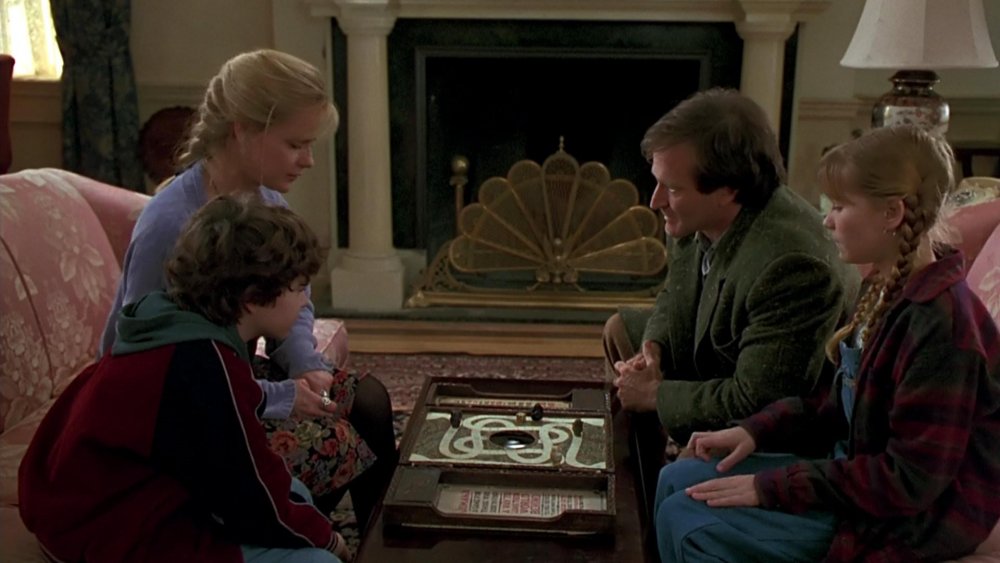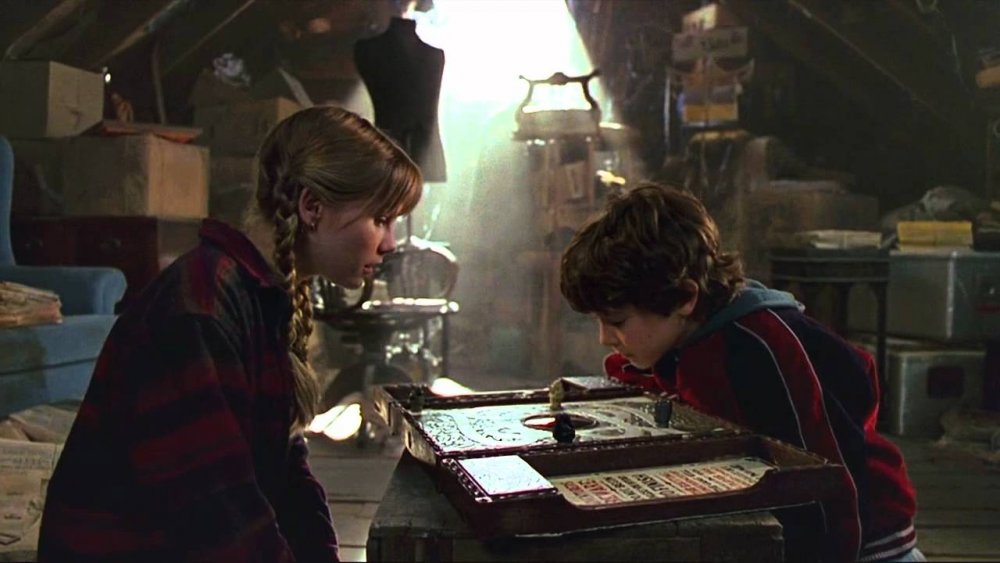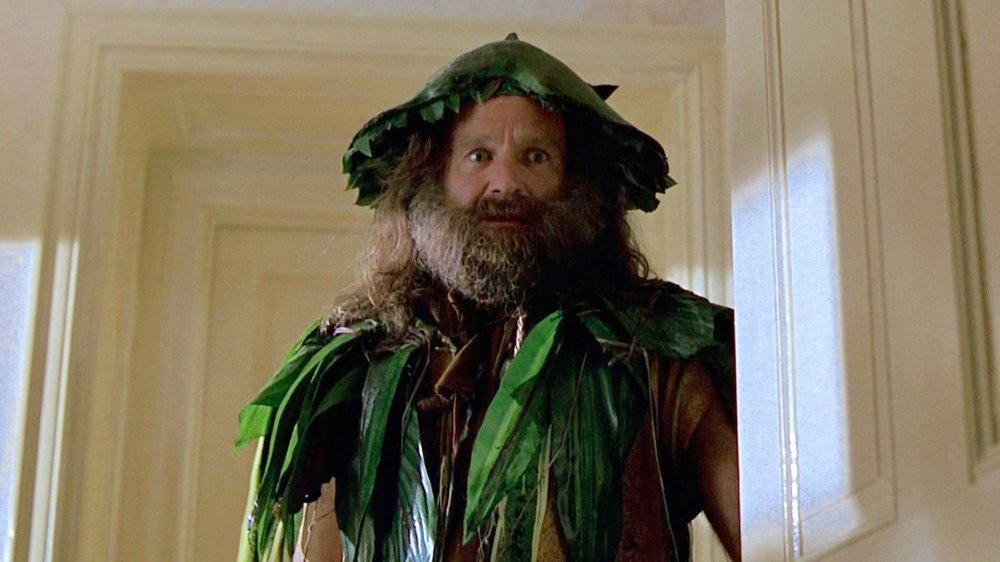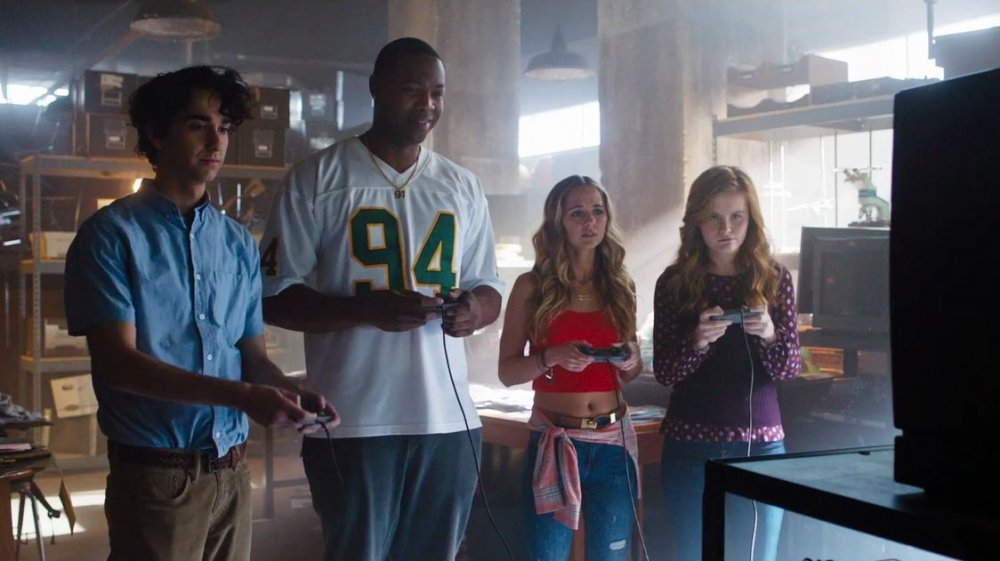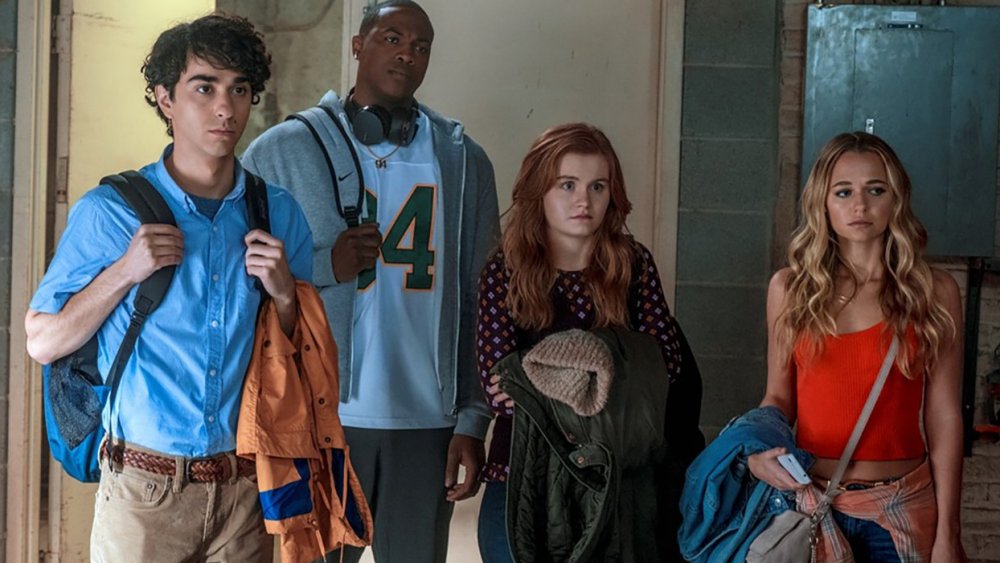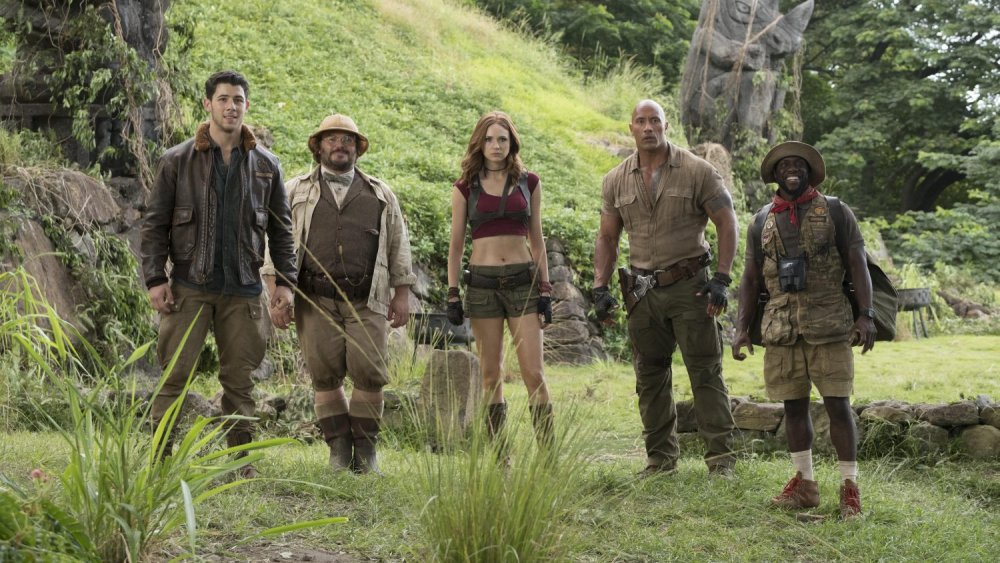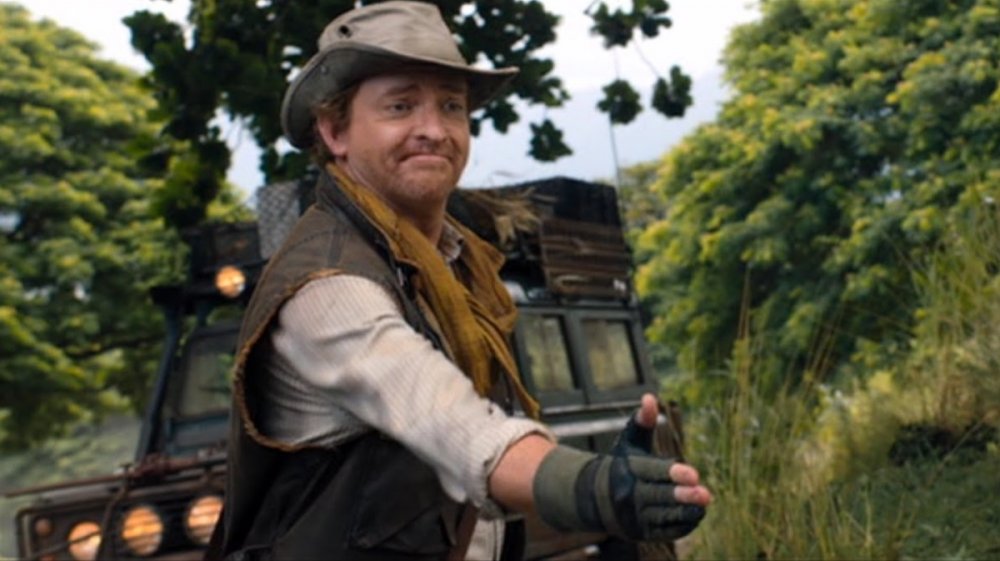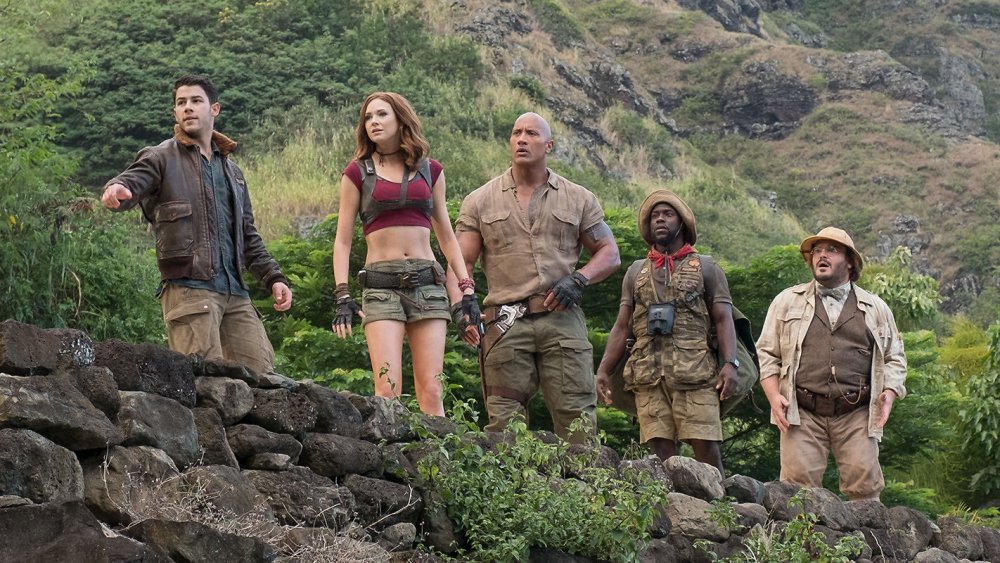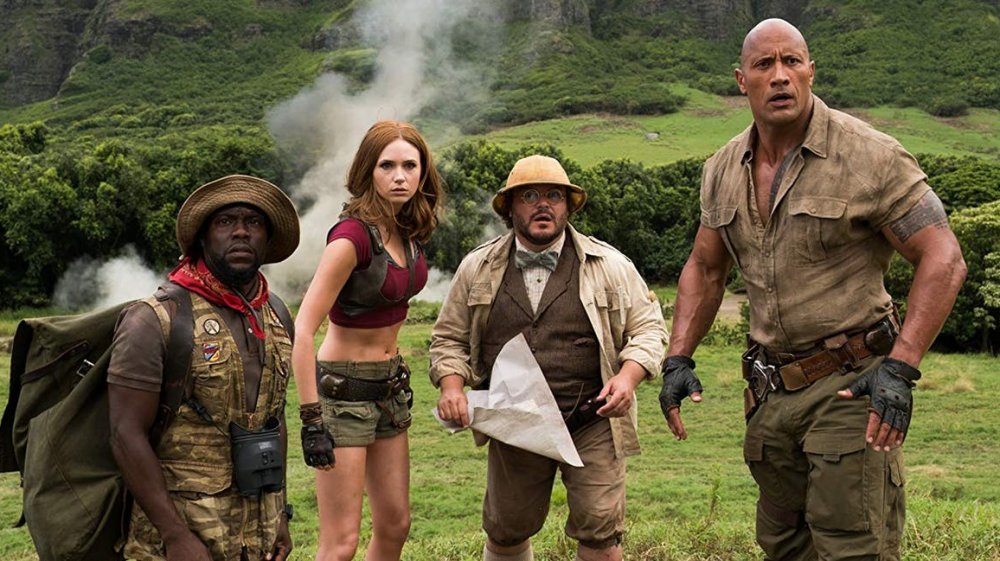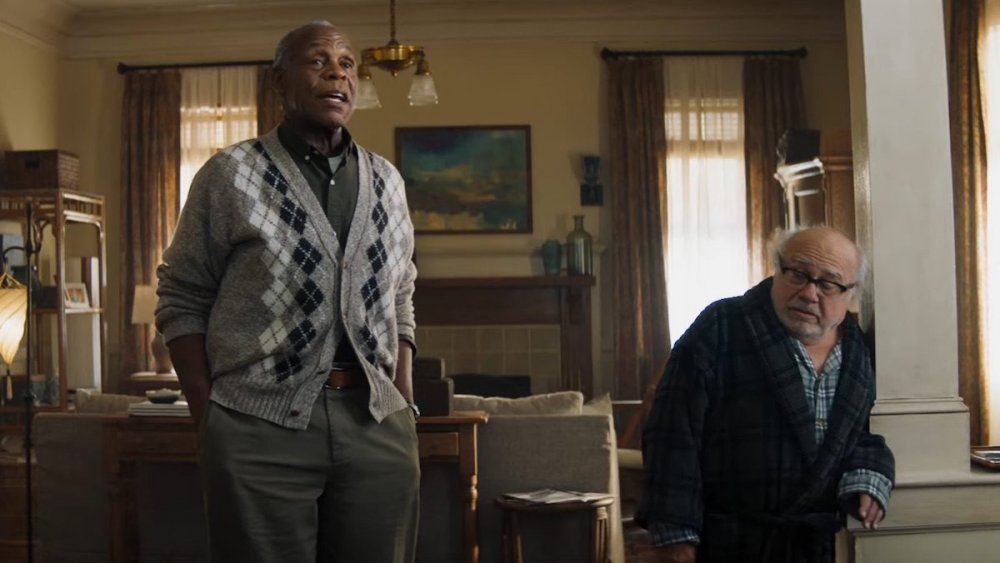Read This Before You Go See Jumanji: The Next Level
Do you hear the drums?
Yeah, that's right. It's the next Jumanji film, a movie that returns audiences to the lush and deadly jungle of its high-stakes game. Continuing the story that began with the 1995 film starring Robin Williams, Bonnie Hunt, and a young Kirsten Dunst, Jumanji: The Next Level has come a long way from the franchise's humble board game beginnings. Not only has the cast of characters changed, but the format of the game itself is now completely different. While some rules have remained the same, others are constantly evolving, and it can be difficult to keep up.
If it's been a while since you've seen the first two Jumanji films (or three if you count 2005's Zathura: A Space Adventure, although Jon Favreau would really prefer if you didn't), or if you've never entirely understood how the world of Jumanji works, we've got you covered. Below, we've gathered together everything you need to know before you go see Jumanji: The Next Level, including past events, new characters, and the rules of the film's perilous game.
The origins of Jumanji
The original Jumanji film is based on the 1981 picture book of the same name by Chris Van Allsburg. The book follows a pair of siblings named Judy and Peter Shepherd who come across a board game in the park, along with the warning, "Do not begin unless you intend to finish." Judy and Peter play the game, which brings animals and natural disasters to life in the various rooms of their house, until Judy finally ends the game and yells, "Jumanji!" And after shouting the magical phrase, everything returns to normal. They then return the game to the park, and the book ends with the Shepherd siblings watching their neighbors taking the game home.
In the films, the characters come upon the game in much the same way, with all of them happening upon it seemingly by accident — although the films imply that the game has a degree of sentience to it and can manipulate circumstances so that it can be found and played. The first glimpse we get of the game is at the beginning of the first movie. In 1869, a pair of brothers fearfully bury a box in the woods, at the location where Alan Parrish will discover it 100 years later. Since the brothers are likely not the game's creators or first owners — they flee in terror at the drum sounds coming from within the box — we can gather that the game is more than 150 years old, although the circumstances and timing of its creation remain a mystery.
Alan Parrish plays a game
After finding a board game called Jumanji at a construction site in 1969, Alan Parrish (Adam Hann-Byrd) begins playing with his friend, Sarah Whittle (Laura Bell Bundy). However, they've barely begun to play before Alan is sucked into the game, with a message that he must wait in the jungle until someone rolls a five or eight. But instead of taking her turn, the terrified Sarah flees from the house, and the game is placed in the attic.
Later, in 1995, orphans Judy (Kirsten Dunst) and Peter Shepherd (Bradley Pierce) move into Alan Parrish's old house with their aunt and discover the game in the attic. They begin to play, and Peter's role releases Alan from the game. Now an adult (Robin Williams), Alan has been living in the jungle for the past 26 years, and he uses the skills he's acquired there to help the children fend off the animals and natural disasters that emerge from the game. However, since the game from 1969 was never finished, they have to find the adult Sarah (Bonnie Hunt) and convince her to take her turn so that they can complete the game and return everything to normal.
After taking turns that result in the game unleashing increasingly catastrophic levels of mayhem and destruction, Alan finally finishes the game and says, "Jumanji." Everything is returned to its pre-game state, including Alan going back to 1969, where he grows up to marry Sarah and prevent the accident that killed Judy and Peter's parents.
The rules of Jumanji
While the game of Jumanji is undeniably tricky and deliberately misleading, it is, at its heart, still a game. The rules written on the board game state that, "You roll the dice to move your token, doubles get another turn, and the first player to reach the end wins." With each turn, the game creates a new obstacle for the players to face, making it progressively more difficult to finish the game. Through playing, the characters learn that no one can forfeit, leave the game, or skip a turn, and there are consequences for attempting to cheat in order to end the game sooner. After completing their final turn, the winning player must say the word "Jumanji" out loud in order to end the game.
Over the course of the films, however, the board game shifts its form to become a video game. So naturally, some of the rules had to change, but the basics have stayed the same. Dice-specific stipulations such as the doubles rule no longer apply, but players still have to complete the game once it's started, can't forfeit or quit, and have to say "Jumanji" out loud in order to finish it.
Beating the game
In both Jumanji and Jumanji: Welcome to the Jungle, a player gets trapped inside the game for decades due to no one being able to beat it. In Alan Parrish's case, his problem was that Sarah stopped playing, and therefore didn't roll the five or eight that was needed in order to bring him out. Even when Judy and Peter thought they were starting a new game, they were really just continuing Alan and Sarah's game from 26 years earlier.
Then in Welcome to the Jungle, Alex Vreeke gets caught inside the game for 21 years after his father finds it on the beach in 1996, where it washed up after Alan and Sarah threw it into the river in 1969. While the original version of Jumanji was a board game, and thus required at least two players, once it shifted into a quest-based video game version, it became possible to play as a solo player. However, while Alex technically could've completed the game by himself, he wound up stuck when he came up against an obstacle he couldn't get past on his own. Like Alan, Alex required other players to join in later to finish the game and return them all to their pre-game state. If you're unlucky enough to get caught inside Jumanji, and there's no one around to take the next turn or you can't complete the game on your own, you'll simply be stuck "playing" forever.
Time works differently in Jumanji
After the first film, Alan Parish returns to 1969 and is able to grow up normally in the real world. However, in Welcome to the Jungle, we see his name still carved into the house he constructed inside of Jumanji, implying that the game still has a record of the 26 years he spent in the jungle, even if they were erased in the outside world.
Meanwhile, in the real world, everything resets once the game finishes, although the players retain their memories of what happened. This means that Alan and Sarah remember everything from the first time they grew up, even after reverting to their childhood selves, and they're able to make changes the second time around. On the other hand, Judy and Peter, having been born while Alan and Sarah's game was still ongoing, were entirely reset, and as a result, they have no memories of the game at all.
But in Welcome to the Jungle, the way characters experience time within the game seems to have changed a bit. "Time is kind of funny here," Alex says in Welcome to the Jungle, before estimating that he's been inside the game for a couple months, when it's really been two decades. However, while Alex returns to his teenage life in 1996, which should reset everything that came afterward, the four teenagers in 2017 still remember playing the game, despite being born after Alex started playing. It's yet another example of Jumanji's tendency to play fast and loose with its own rules.
The changing nature of the game
At the beginning of Jumanji: Welcome to the Jungle, Alex's father finds the board game on the beach and brings it home to his son. But unlike Judy and Peter in the first film, who immediately sat down to play, Alex examines the game briefly before tossing it aside, unimpressed. "Who plays board games?" he says, before picking up his video game controller and resuming a game of Twisted Metal.
Later, as Alex sleeps, we see the flashing green light of Jumanji. The next time Alex opens the box, he sees it contains not a board game, but a video game cartridge. It would seem that Jumanji is a game that wants to be played, and when it became clear that Alex had no interest in video games, it altered its form to something that would be more enticing to him. In the first film, Jumanji goes 100 years without being played, so it's possible that it can't change its form unless it's first exposed to a different version of a game that it can copy.
At the end of Welcome to the Jungle, the main characters smash the Jumanji gaming console with a bowling ball, although we know that's not the end of the story. In the trailers for The Next Level, characters speculate that the game is "busted" when they get sucked in again, but based on what we've already seen, it could just be Jumanji reinventing itself yet again in order to get people to play.
The Jumanji breakfast club
Unlike Sarah and Alan or Judy and Peter, at the beginning of Jumanji: Welcome to the Jungle, the four teenagers who go on to play the game aren't friends, siblings, or really much of anything. Spencer, Bethany, Martha, and Fridge are all students at Brantford High School, and that's about where their similarities end. Spencer and Fridge were best friends as kids, but now their relationship consists entirely of Spencer doing Fridge's homework for him, and while Spencer admires Martha from afar, they don't really talk. Meanwhile, Bethany is off in her own self-absorbed world, and she doesn't seem to notice any of the others.
The four are sentenced to serve detention together in the school's storage room on a Saturday, removing staples from magazines so they can be recycled. Rather than engage in their tedious task, they decide to play a video game Fridge discovers among the shelves, and soon, they find themselves trapped inside Jumanji. After a harrowing adventure inside the game, including a number of near-death — and a few actual death — experiences, the four learn to lean on and appreciate one another, and they emerge from the game as good friends with a new outlook on life. Bethany learns to be brave and selfless, Martha finds confidence, Fridge learns humility, and Spencer learns to lead and conquer his fears. In addition, Fridge and Spencer rekindle their friendship, and Spencer and Martha embark on a romantic relationship.
The avatars of Jumanji
While the main characters of Jumanji: Welcome to the Jungle are Spencer, Martha, Fridge, and Bethany, the people we spend the most time watching in the film aren't technically people at all. Instead, they're video game avatars. Avatars are characters that exist within the game and are controlled by outside players, and in Welcome to the Jungle, each character spends most of the film occupying the body of their chosen avatar.
Spencer is Dr. Smolder Bravestone, Martha is Ruby Roundhouse, Fridge is Franklin "Mouse" Finbar, Bethany is Professor Sheldon "Shelly" Oberon, and Alex is Jefferson "Seaplane" McDonough. In the trailers for The Next Level, it appears as though Martha is the only one to have kept her same avatar, while Fridge will now be playing as Professor Oberon, Spencer's grandfather Eddie will be Dr. Bravestone, and Eddie's friend Milo Walker will be Mouse Finbar.
Each avatar has its own strengths and weaknesses, which remain with the avatar no matter which player is controlling it. Ruby Roundhouse's strengths are karate, T'ai chi, aikido, and dance fighting, and her weakness is venom. Professor Oberon's strengths are cartography, archaeology, and paleontology, and his weakness is endurance. Mouse's strengths are zoology and "weapons valet," while his weaknesses are cake, speed, and strength. Smolder Bravestone's strengths are speed, throwing boomerangs, climbing, being "fearless," and his "smoldering intensity," with zero weaknesses. Seaplane McDonough tells us that his strengths are piloting and margaritas, and that one of his weaknesses is mosquitoes, but he doesn't mention what the others may be.
The NPCs and mechanics of Jumanji
Although the board game version of Jumanji had several rules specific to rolling dice, the video game version adapts the mechanics of its gameplay to fit its new format. Now instead of taking turns, the players work together to complete levels, each with its own goals and challenges. The levels get increasingly more difficult as players progress through the game, and all build toward an ultimate end goal. Additionally, each character starts the game with three lives, although it's possible for one player to transfer one of their extra lives to another player under dire circumstances. If a player dies, assuming they have an additional life, they'll respawn, along with any objects they were holding when they died, appearing in the sky over the game and landing in approximately the same spot.
Jumanji also contains several NPCs (non-player characters) that interact with the characters' avatars and either guide them on their way or attempt to work against them. The main NPCs in Welcome to the Jungle are Nigel, who serves as a guide for the characters, and Van Pelt, who's the game's antagonist. Van Pelt also existed in the board game version of Jumanji as a big game hunter determined to keep Alan and the other players from completing the game. In Welcome to the Jungle, Van Pelt is given a more thorough backstory and a similar goal to the player characters, but his role as the game's resident bad guy appears to be a Jumanji constant.
What happened in Jumanji: Welcome to the Jungle?
So what exactly happens in Jumanji: Welcome to the Jungle? Well, after getting trapped inside Jumanji, and after a period of initial incredulity and denial, Spencer, Martha, Fridge, and Bethany have to work together to deliver a magical jewel called the Jaguar's Eye to a giant jaguar statue before the sinister Russell Van Pelt can get his hands on it. Possessed by the power of the jewel, Van Pelt is able to control Jumanji's animals, which works against the players as they attempt to complete their task. The group is given clues meant to inform their quests, which leads them to Alex's avatar, who'd started the game in 1996 but had gotten stuck when he found himself down to his last life on a challenge he didn't know how to complete.
Drawing on their avatars' collective strengths, the group is finally able to beat the level that had thwarted Alex for so long, although Alex loses his last life in the process, and Bethany has to transfer one of her extra lives to him through CPR. The five players reach the statue, return the jewel, and call out, "Jumanji," ending the game. Shaking hands with each of them, Nigel returns them to their lives at the moment before they entered the game. The four Brantford High teens walk to the previously run-down Vreeke home, where they encounter a now grown-up Alex, who tells them he'd emerged from the game in 1996 and had lived a good life, naming his oldest daughter Bethany. Later, the four teens destroy the game.
Who's returning for Jumanji: The Next Level?
Almost every major player from Jumanji: Welcome to the Jungle is coming back for Jumanji: The Next Level, although we'll get to see several of them in a brand new light. Ser'Darius Blain, Madison Iseman, Morgan Turner, and Alex Wolff will be reprising their roles as high school students Fridge, Bethany, Martha, and Spencer, and Dwayne Johnson, Kevin Hart, Jack Black, Karen Gillan, and Nick Jonas will be back as avatars Smolder Bravestone, Mouse Finbar, Shelly Oberon, Ruby Roundhouse, and Seaplane McDonough. Also returning are Colin Hanks as the grown-up Alex and Rhys Darby as Jumanji's NPC guide, Nigel. The only significant character from Welcome to the Jungle who hasn't been confirmed for the sequel is Bobby Cannavale, who played the villainous Van Pelt.
However, while most of the faces in The Next Level will be familiar, some of the actors will be portraying totally different characters. Due to Jumanji's use of avatars, only Karen Gillan will be portraying the same player as in Welcome to the Jungle. Fridge, who played as Kevin Hart's Mouse Finbar the first time around, will now be controlling Jack Black's Shelly Oberon, while Johnson and Hart will be portraying the avatars of two brand-new characters: Spencer's grandfather, Eddie, and Eddie's friend, Milo. We've yet to learn which avatars Bethany and Spencer wind up controlling, or if Alex re-enters the game at all, but one thing's for sure — this game will be very different from the last one.
Who are the new characters in Jumanji: The Next Level?
Joining the cast for Jumanji: The Next Level are comedic acting legends Danny DeVito and Danny Glover, playing Spencer's grandfather, Eddie Gilpin, and his friend, Milo Walker, respectively. If The Next Level follows the same format as Welcome to the Jungle, we don't expect to see DeVito and Glover on screen for very long, but it looks like the characters will still have a significant presence in the movie after they accidentally enter the game and wind up controlling the avatars portrayed by Dwayne Johnson and Kevin Hart. If beating the game was difficult with five high school students, we can only imagine how difficult it will be with two teens (neither of which is the video game-savvy Spencer) and two confused senior citizens.
Also coming aboard for the next Jumanji outing are Once Upon a Time's Dania Ramirez and Crazy Rich Asians and The Farewell star Awkwafina, both in undisclosed roles. While Ramirez doesn't appear in the trailer at all, the brief glimpse we get of Awkwafina suggests that she'll be playing a character within the game, although whether she'll be another avatar or a new NPC is anyone's guess. Whoever she is, sources have told The Hollywood Reporter that Awkwafina's role is "key" and "significant," leading us to guess that she's likely either an avatar for one of the players — possibly Spencer, Bethany, or even Alex — or she's the game's new villain.
